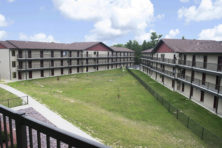Housing Riddle Has No Simple Solution
- Share
- Tweet
- Pin
- Share
One of the greatest challenges of solving problems on a community-wide level is determining where one problem ends and another begins. Unearthing a way for young families to live and work in Northern Door is a prime example.
The Village of Sister Bay wants more young families to settle in the community but suffers from a dearth of housing affordable to the 25-35 year-old demographic they’d like to attract. That age group in Door County earns an average annual wage of $26,000, making only homes under $100,000 affordable to them – in a community with just two homes currently listed on the county’s Multiple Listing Service even coming in under $150,000.
The lack of home ownership possibilities isn’t the only problem, however. The area lacks low-cost rental options as well, creating other problems for low-income workers.
Beverly Luethge works at the Door County Housing Authority, which provides rental assistance to low and middle-income families.
“There’s not a lot of affordable rental options out there,” she said. “The further north you go the harder it is to find affordable housing.”
Few, if any, apartments north of Egg Harbor qualify as affordable by the authority’s standards for assistance, Luethge said.
“If you are paying more than 40 percent of your adjusted monthly income on rent, that’s not affordable,” she said.
To qualify for rental assistance an individual can earn no more than $19,850 per year and must find an apartment for $450 or less per month, including utilities. Such apartments scarcely exist in the northern part of the peninsula, though Luethge said they do have some clients there.
Clients must find the apartment through a private landlord, who must agree to the program. Luethge said landlords can choose not to participate but in Door County they’ve been very cooperative.
She said she has a lot of seasonal clients who face other challenges as well.
“People start a seasonal job and don’t always think ahead,” she said.
A renter will sign a lease without considering the utility costs in the winter or won’t prepare for costs rising more than expected, as has often been the case in recent years. They plan on a best-case scenario, and when the hours dry up in the winter and bills increase they miss payments and ruin their credit.
Trying to get by on a Door County wage while paying high rent, tenants are unable to save or build credit, making home ownership – even of affordable housing – even more difficult to realize.
If they manage to cobble together the money to buy a home, Luethge said they face another challenge.
“They need to find a house in good shape,” she said. “Having barely squeezed out a loan, they can’t afford repairs or replacements, so they can’t buy a home and have to fix the roof for $6,000. They’re also more susceptible to fluctuations in heating and utilities costs.”
So if they’ve managed to build the credit to buy a home, they risk losing it when costs mount.
There are several programs available in the county to assist people trying to buy a home, however. Sam Perlman of the Door County Economic Development Corporation (DCEDC) said these generally require you earn no more than 80 percent of the Door County median annual income based on household size. A family of four, for example, would have to have a total annual household income below $45,350. An individual could earn no more than $22,140.
“Generally, these are geared to first-time home-buyers regardless of household size,” Perlman explained. “I’ve been surprised at the number of single, young people who have taken advantage of the program. You apply, then you have six months to buy a home. So you can approach lenders and have this in your back pocket.”
In January 2005, the DCEDC launched an initiative to help bridge the affordability gap in Liberty Grove with the MeadowWood development. That program began by offering homes for $115,000 (now $129,000), with no-interest, $15,000 loans available through the Door County Housing Assistance Program for qualified families and individuals.
MeadowWood has not performed as was hoped, with only three sales thus far when Perlman said they hoped to have 15. He said he’s heard several theories for the disappointing sales.
“People are resistant to purchase a small lot,” he said. “They’re not willing to settle or compromise. Some said it’s too far north, though it’s only two miles north of Sister Bay. And there may be a bias against manufactured housing.”
The 80 by 110-foot lot size may also have been a factor.
“Everyone wants their five-acre farmette,” Perlman acknowledged, “but it’s just not always reasonable for a first home.”
But even at a low (for Northern Door) price of $129,000 the homes don’t qualify as affordable for most first-time homebuyers living on a Door County wage.
Despite the myriad hurdles, Luethge thinks the county has the resources to address the problems if a municipality like Sister Bay is willing to take a chance. She urged coupling an affordable rental complex with any housing project.
“There are a lot of ways to get assistance and tax credits to get things like this built,” she said. “There are a lot of caring, creative people in Door County who could come up with a solution.”
If they don’t, the aging population of the community could be in trouble.
“Door County is becoming more and more a retirement community,” Luethge said. “These people will need a lot of services. Where are the working people providing them going to be housed?”
Mavis Arnold at the Door County Job Center said there might be a misperception about who the Door County resident is.
“Certainly there are people up here on the peninsula who think it’s wealthier here than it really is,” she said. “The per capita income is so high because of retirees that we can’t apply for a lot of state and federal programs. But that doesn’t reflect the average wages. People are always surprised that we have people here working very hard living in poverty.”
And unable to plan for a future here.
Want homebuying advice?
Perlman said the first thing any prospective homebuyer should do is get educated.
“Get homebuyer education, either from FISC (Financial Information Services Corporation) or Lakeshore CAP (Community Action Program),” he said. “It will help you determine your readiness to buy and give you adequate preparation to do so, and evaluate your financial position.”
FISC: Contact Gay Pustaver at 920.743.1862
Lakeshore CAP: Contact Chris Loose at 800.924.0510
Or visit the DCEDC on the Web at http://www.doorcountybusiness.com/housing.html



